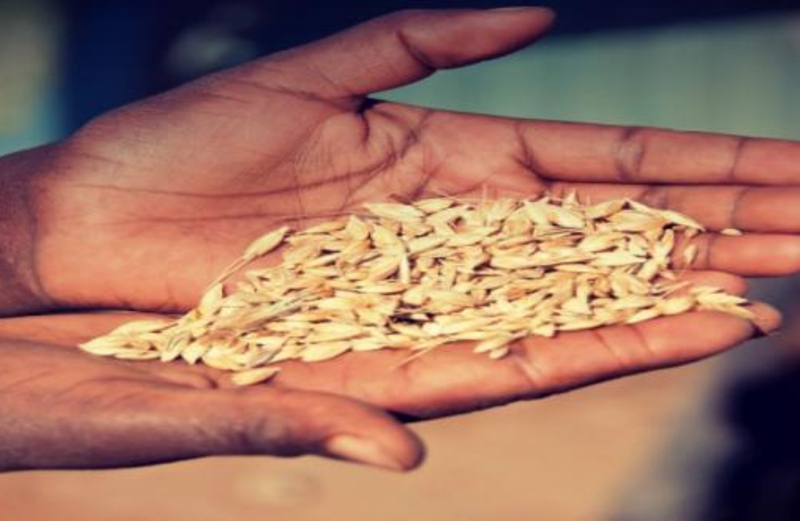Uniting Africa to face climate change

Former Niger prime minister Ibrahim Assane Mayaki has dedicated his career to improving the lives of fellow Africans. Today, as CEO of the New Partnership for Africa’s Development (NEPAD), a South Africa-based body of the African Union, Mayaki is advocating for a radical change in the way the continent farms in order to minimize the environmental impact on the land while yielding better harvests: climate-smart agriculture.
He sees promise in climate-smart initiatives like computer models that assess changing weather patterns, so farmers may be able to change their investments and practices in anticipation of the new growing conditions they will soon confront. Or new seeds cultivated for different growing time frames, to accommodate shorter growing/rainy seasons. Even low-tech tools will have a valuable role to play, such as radio weather bulletins broadcast in Mali to tell farmers when to plant, and text messaging apps like M-Farm, which provides small-scale farmers in Kenya with information about current crop market rates.
Some farming techniques we have used for generations are not consistent with changing weather patterns [and] the demand on agriculture for food . . . We have no choice but to innovate new technologies.”
—Ibrahim Mayaki
Mayaki recently talked with FutureFood 2050 about why climate-smart agriculture strategies will be so important for Africa, where most agriculture is concentrated in smallholder farms of less than 10 hectares.
FutureFood 2050: What are the top priorities for Africa’s climate-smart agriculture strategies in the next few decades?
Mayaki: In the short-term, [we have to] make accessible to a critical mass of farmers appropriate technologies, associated skills and information that enable them [to] adapt and sustain production and productivity even in extreme weather conditions. This includes technologies and techniques such as . . . reduced or zero tillage . . . rainwater harvesting, assortment of seed, and breeding stock appropriate [for] the local agro-ecosystems in terms [of] disease, water availability [and] temperature.
This will require attention to land and water governance—[especially] giving rural communities and women access and ownership that will allow for appropriate investments. In the medium- to long-term, strengthening systemic resilience among rural farming communities will be key. Capacity-building and an enabling environment [are] critical. This includes institutional capacity-building and the ability to predict and manage extreme weather.
For Africa, the expansion of irrigation is [also] an important element in strengthening resilience. Currently less than 5 percent of arable land is irrigated, and this is mostly large-scale commercial.
FutureFood 2050: What and where are the toughest challenges likely to be?
Mayaki: First and foremost, the bulk of the work will be on changing mindsets. It will be important that science, availability of appropriate technologies, skills development and information support keeps pace with the change in mindset. The major challenge will be political action and leadership.
Another key challenge comes from the character of climate-smart agriculture—it is not a one-sector issue, it is not a one-discipline issue, it is not even [a] one-country or regional issue. Scaling up will require innovative multi-partner, multi-sectorial collaboration, alliances and partnerships. Public-private partnerships will require aspects such as rebuilding trust [and] strengthening credibility of public institutions, e.g., predictable decision-making processes [and] negotiation skills among public staff.
FutureFood 2050: Are climate-smart agriculture solutions likely to involve use of new technology?
Mayaki: Some farming techniques we have used for generations are not consistent with changing weather patterns [and] the demand on agriculture for food for the global 9 billion population by 2050, [up] from the current 7 billion. We have no choice but to innovate new technologies—in the type of seed and breeding stock we use, through tillage or no tillage technologies, including rippers, jab planters and direct seeders, as well as in the agro-industry.
Expanded and more accessible irrigation technologies and practices [are] another way to mitigate the effects climate change will have on duration, stability and predictability of rain.
FutureFood 2050: How are African nations addressing the policy changes needed to implement climate-smart agriculture?
Mayaki: When you combine the effects of climate change and land-water degradation in most of our farming communities, the situation has been tragic. What may seem like just managing to push back the adverse effects of climate change and land-water degradation at mere survival levels, has to be a massive effort and success by communities and their governments.
The majority of countries in the Common Market for Eastern and Southern Africa (COMESA) region are working on robust agriculture/climate change policy framework to rally and guide coherent policy practice and investment financing. Only 10 years ago, such an issue was not even on the table for discussion.
FutureFood 2050: What kinds of new global climate change policies would best benefit African crop production?
Mayaki: Global climate change policies will rally investment financing into smallholder farming technologies and infrastructure, including research in new seed varieties—in relation to disease control, new/different temperature levels, different growing duration, etc. At the center of Africa’s needs and priorities in relation to global climate change policies is adaptation, as well as building resilience in local systems and reducing the level and form of vulnerability.
FutureFood 2050: How do you see the role of the developed world in terms of building alliances to address climate-smart agriculture issues in the developing world?
Mayaki: Building alliances to address climate-smart agriculture is a global imperative, and it’s not just about addressing climate-smart agriculture in the developing world, but equally in the developed world. These alliances are or should be about mutually interacting for the greater good.
The Africa Climate-Smart Agriculture Alliance is emerging as an organic response to multi-sectorial, multi-institutional efforts to address climate-smart agriculture. The alliance has critical lessons [that] would be valuable to other continents. The NEPAD Agency is currently co-chairing the Global Alliance for Climate-Smart Agriculture—a global effort that is bringing together developed and developing, civil society, private sector and governments to interact along the shared vision to make climate-smart agriculture a global success.
